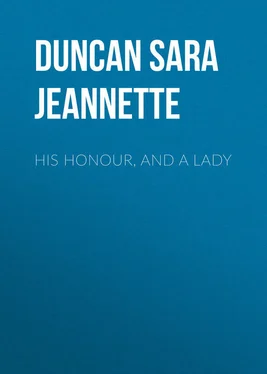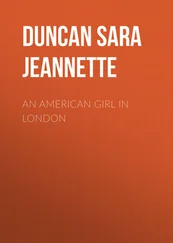Sara Duncan - His Honour, and a Lady
Здесь есть возможность читать онлайн «Sara Duncan - His Honour, and a Lady» — ознакомительный отрывок электронной книги совершенно бесплатно, а после прочтения отрывка купить полную версию. В некоторых случаях можно слушать аудио, скачать через торрент в формате fb2 и присутствует краткое содержание. Жанр: foreign_antique, foreign_prose, на английском языке. Описание произведения, (предисловие) а так же отзывы посетителей доступны на портале библиотеки ЛибКат.
- Название:His Honour, and a Lady
- Автор:
- Жанр:
- Год:неизвестен
- ISBN:нет данных
- Рейтинг книги:5 / 5. Голосов: 1
-
Избранное:Добавить в избранное
- Отзывы:
-
Ваша оценка:
- 100
- 1
- 2
- 3
- 4
- 5
His Honour, and a Lady: краткое содержание, описание и аннотация
Предлагаем к чтению аннотацию, описание, краткое содержание или предисловие (зависит от того, что написал сам автор книги «His Honour, and a Lady»). Если вы не нашли необходимую информацию о книге — напишите в комментариях, мы постараемся отыскать её.
His Honour, and a Lady — читать онлайн ознакомительный отрывок
Ниже представлен текст книги, разбитый по страницам. Система сохранения места последней прочитанной страницы, позволяет с удобством читать онлайн бесплатно книгу «His Honour, and a Lady», без необходимости каждый раз заново искать на чём Вы остановились. Поставьте закладку, и сможете в любой момент перейти на страницу, на которой закончили чтение.
Интервал:
Закладка:
“They seem to be delightful people,” continued the elderly gentleman, earnestly.
“I daresay,” Miss Daye replied, with grave deliberation. “They’re very decorative,” she added absently. “That’s a purely Indian vegetable, Mr. Pond. Rather sticky, and without the ghost of a flavour; but you ought to try it, as an experience, don’t you think?”
It occurred to Mrs. Daye sometimes that Mr. Ancram was unreasonably difficult to entertain, even for a Chief Secretary. It occurred to her more forcibly than usual on this particular evening, and it was almost with trepidation that she produced the trump card on which she had been relying to provoke a lively suit of amiabilities. She produced it awkwardly too; there was always a slight awkwardness, irritating to so habile a lady, in her manner of addressing Mr. Ancram, owing to her confessed and painful inability to call him “Lewis” – yet. “Oh,” she said finally, “I haven’t congratulated you on your ‘Modern Influence of the Vedic Books.’ I assure you, in spite of its being in blue paper covers and printed by Government I went through it with the greatest interest. And there were no pictures either,” Mrs. Daye added, with the ingenuousness which often clings to Anglo-Indian ladies somewhat late in life.
Mr. Ancram was occupied for the moment in scrutinising the contents of a dish which a servant patiently presented to his left elbow. It was an ornate and mottled conception visible through a mass of brown jelly, and the man looked disappointed when so important a guest, after perceptible deliberation, decisively removed his eyeglass and shook his head. Mrs. Daye was in the act of reminding herself of the probably impaired digestion of a Chief Secretary, when he seemed suddenly recalled to the fact that she had spoken.
“Really?” he said, looking fully at her, with a smile that had many qualities of compensation. “My dear Mrs. Daye, that was doing a good deal for friendship, wasn’t it?”
His eyes were certainly blue and expressive when he allowed them to be, his hostess thought, and he had the straight, thin, well-indicated nose which she liked, and a sensitive mouth for a man. His work as part of the great intelligent managing machine of the Government of India overimpressed itself upon the stamp of scholarship Oxford had left on his face, which had the pallor of Bengal, with fatigued lines about the eyes, lines that suggested to Mr. Ancram’s friends the constant reproach of over-exertion. A light moustache, sufficiently well-curled and worldly, effectually prevented any tinge of asceticism which might otherwise have been characteristic, and placed Mr. Ancram among those who discussed Meredith, had an expensive taste in handicrafts, and subscribed to the Figaro Salon . His secretary’s stoop was not a pronounced and local curve, rather a general thrusting forward of his personality which was fitting enough in a scientific investigator; and his long, nervous, white hands spoke of a multitude of well-phrased Resolutions. It was ridiculous, Mrs. Daye thought, that with so agreeable a manner he should still convey the impression that one’s interest in the Vedic Books was not of the least importance. It must be that she was over-sensitive. But she would be piqued notwithstanding. Pique, when one is plump and knows how to hold oneself, is more effective than almost any other attitude.
“You are exactly like all the rest! You think that no woman can possibly care to read anything but novels! Now, as a matter of fact I am devoted to things like Vedic Books. If I had nothing else to do I should dig and delve in the archaic from morning till night.”
“The implication being,” returned Mr. Ancram sweetly, “that I have nothing else to do.”
Mrs. Daye compressed her lips in the manner of one whose patience is at an end. “It would serve you perfectly right,” she exclaimed, “if I didn’t tell you what a long review of it I saw the other day in one of the home papers.”
Ancram looked up with an almost imperceptible accession of interest.
“How nice!” he said lightly. “A fellow out here always feels himself in luck when his odds and ends get taken up at home. You don’t happen to remember the paper – or the date?”
“I’m almost sure it was the Times ,” Mrs. Daye replied, with rather an accentuation of rejoiceful zeal; “but Richard can tell you. It was he who drew my attention to the notice.”
Mr. Ancram’s eyebrows underwent a slight contraction. “Notice” did not seem to be a felicitous word.
“Oh, thanks,” he said. “Never mind; one generally comes across those things sooner or later.”
“I say, Ancram,” put in Mr. St. George, who had been listening on Mrs. Daye’s left, “you Asiatic Society fellows won’t get as much out of Church for your investigations as you did out of Spence.”
Ancram looked fixedly at a porcelain cherub that moored a boatful of pink-and-white confectionery to the nearest bank of the Viceregal roses. “Sir Griffiths was certainly generous,” he said. “He gave Pierson a quarter of a lakh, for instance, to get his ethnological statistics together. It was easy to persuade him to recognise the value of these things.”
“It won’t be easy to get this man to recognise it,” persisted St. George. “He’s the sort of fellow who likes sanitation better than Sanscrit. He’s got a great scheme on for improving the village water-supply for Bengal, and I hear he wants to reorganise the vaccination business. Great man for the people!”
“Wants to spend every blessed pice on the bloomin’ ryot,” remarked Captain Delaine, with humorous resentment.
“Let us hope the people will be grateful,” said Ancram vaguely.
“They won’t, you know,” remarked Rhoda Daye to Mr. Pond. “They’ll never know. They are like the cattle – they plough and eat and sleep; and if a tenth of them die of cholera from bad water, they say it was written upon their foreheads; and if Government cleans the tanks and the tenth are spared, they say it is a good year and the gods are favourable.”
“Dear me!” said Mr. Pond: “that’s very interesting.”
“Isn’t it? And there’s lots more of it – all in the Calcutta newspapers, Mr. Pond: you should read them if you wish to be informed.” And Mr. Pond thought that an excellent idea.
When a Lieutenant-Governor drops into the conversational vortex of a Calcutta dinner-party he circles on indefinitely. The measure of his hospitality, the nature of his tastes, the direction of his policy, his quality as a master, and the measure of his popularity, are only a few of the heads under which he is discussed; while his wife is made the most of separately, with equal thoroughness and precision. Just before Mrs. Daye looked smilingly at Mrs. St. George, and the ladies flocked away, some one asked who Mrs. Church’s friends were in Calcutta, anyway: she seemed to know hardly any one person more than another – a delightful impartiality, the lady added, of course, after Lady Spence’s favouritism. The remark fell lightly enough upon the air, but Lewis Ancram did not let it pass. He looked at nobody in particular, but into space: it was a way he had when he let fall anything definite.
“Well,” he said, “I hope I may claim to be one. My pretension dates back five years – I used to know them in Kaligurh. I fancy Mrs. Church will be appreciated in Calcutta. She is that combination which is so much less rare than it used to be – a woman who is as fine as she is clever, and as clever as she is charming.”
“With all due deference to Mr. Ancram’s opinion,” remarked Mrs. Daye publicly, with one hand upon the banister, as the ladies went up to the drawing-room, “I should not call Mrs. Church a fine woman. She’s much too slender – really almost thin!”
Читать дальшеИнтервал:
Закладка:
Похожие книги на «His Honour, and a Lady»
Представляем Вашему вниманию похожие книги на «His Honour, and a Lady» списком для выбора. Мы отобрали схожую по названию и смыслу литературу в надежде предоставить читателям больше вариантов отыскать новые, интересные, ещё непрочитанные произведения.
Обсуждение, отзывы о книге «His Honour, and a Lady» и просто собственные мнения читателей. Оставьте ваши комментарии, напишите, что Вы думаете о произведении, его смысле или главных героях. Укажите что конкретно понравилось, а что нет, и почему Вы так считаете.












